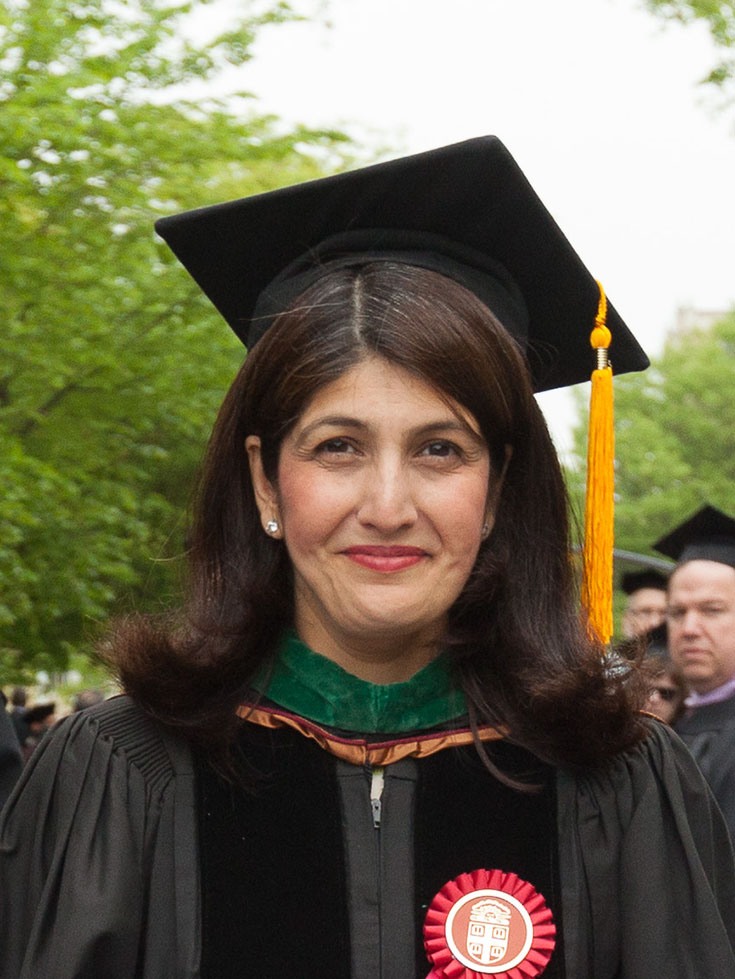From a young age, Monica Shah’s parents encouraged her and her brother toward paths of independent thinking and giving back. “My father loved to give me advice—no surprise—and there were two things that I remember that he would always say to me that have really deeply influenced me," she says. "First, how important it was to leave the world a better place and pursue work that would have an impact. And, second, how important it was to forge your own path, to pursue your dreams even if it was unconventional and other people didn't agree with what you were doing or couldn't understand why.”
Monica Shah ’89 MD’94: An unconventional approach to a career in medicine
The research leader in cardiology and gene therapy reflects on her family’s history of giving back and explores how Brown has been a foothold to grow her remarkable career.
A PLME Beginning
Shah came to Brown as part of the eight-year Program in Liberal Medical Education (PLME) where she studied comparative literature before moving on to The Warren Alpert Medical School.
“My experience was just tremendous,” says Shah. “Not only was I able to pursue both a rigorous medical education, as well as literature and writing, but I also had incredible mentors who provided invaluable guidance and encouragement.”
After medical school, Shah completed her residency in internal medicine at the Johns Hopkins Hospital and a fellowship in cardiology at Duke University, where she received specialized training in clinical research at the Duke Clinical Research Institute. She also completed a fellowship in heart failure and cardiac transplantation at the Brigham and Women’s Hospital. Shah then steered her career in an unexpected direction when she began a nearly decade-long career at the National Institutes of Health (NIH).
“I also feel very fortunate to have had a medical education at Brown, which has shaped my thinking and has opened so many doors.”

Interdisciplinary thinking
“I have always loved clinical research, multi-disciplinary collaboration, and bringing people together to build programs,” says Shah. “I also enjoy new challenges and believe in continual learning. Moving from academia to government to industry has given me a broad perspective on clinical research and an appreciation for the many partners needed to achieve success.”
At the NIH, Shah developed national programs to advance research in heart failure and HIV-related heart, lung, and blood disease and led programs to optimize the design and execution of clinical trials. She later joined the National Center for Advancing Translational Sciences where she led the Trial Innovation Network in the Division of Clinical Innovation.
“I'm so grateful to have had the opportunity to pursue work that may have a historic impact by changing how we treat cardiovascular disease and actually for that matter any type of disease,” said Shah, speaking of her career in clinical research, cardiology, and gene therapy. “I also feel very fortunate to have had a medical education at Brown, which has shaped my thinking and has opened so many doors.”
Working in industry was Shah’s next calling, and she spent five years at IQVIA, a leading global provider of advanced analytics, technology solutions, and clinical research services to the life sciences industry. There, Shah built and led programs to advance research in the field of cell and gene therapy, from early-stage clinical development, to execution of clinical trials, to development of long-term follow-up studies, to commercialization strategies.
A legacy of lasting impact
In all these leaps, Shah was guided by that advice she received from her father to pursue work that would have an impact, and to forge her own path.
Shah’s parents Ravindra Fulchand Shah and Manjula Ravindra Shah felt deeply that they wanted to contribute to creating a generation of physicians who would creatively use their education to make the world a better place. In that spirit, they founded a scholarship for students at The Warren Alpert Medical School.
While Shah’s parents tragically passed away nineteen years ago, Shah views their scholarship—as well as their core principles of hard work, service, and above all education—as crucial components of their efforts to create an impact that would reverberate for many years to come.
Shah has honored her parents’ proud legacy by remaining steadfast in her commitments to medical innovation and academic scholarship. Shah spoke about her journey at the Celebration of Medical Scholarships, an event held October 1, that is part of the 50 Years of Medicine at Brown series commemorating the founding of The Warren Alpert Medical School.
“Think big, take risks”
Monica Shah ’89 MD’94 describes the value her parents placed on education and how the scholarship they established carries on their legacy.
What’s next for Shah?
She is now Senior Vice President at a leading biotech company and spearheading the development of cardiovascular gene therapies, using her expertise to work towards developing potentially transformative treatments for devastating rare diseases. Shah is passionate about the potential for gene therapies, and hopes to help advance this emerging field. Through her commitment to giving back and her groundbreaking research, Shah is living out her parents’ legacy.
Visit Brown's Medical Alumni & Friends online
Your hub for resources, news, and connections with Brown's worldwide medical alumni community.